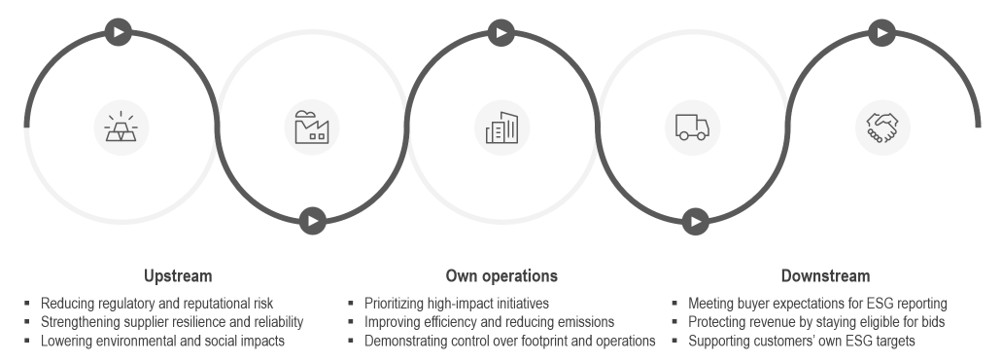Unlocking Business Value from ESG Data


As the first wave of companies (Wave 1) required to report under the CSRD (Corporate Sustainability Reporting Directive) have already published their sustainability statements, the focus is now shifting to the next group (Wave 2), soon approaching their reporting obligation. The need for accurate, traceable, and comparable ESG (Environmental, Social, Governance) data is clear, but ongoing discussions in the EU are creating uncertainty around timing and to what extent the scope of the directive may be reduced. At the same time, this growing data visibility represents far more than a compliance exercise - it is a lever to unlock lasting business value.
Data visibility lays the foundation for value creation
The real opportunity in the ESG data lies beyond mere compliance. When ESG data is visible - surfacing the good, the bad, and the gaps - it can be purposely leveraged to strengthen performance and create business value. Up-to-date and accessible ESG data across an organization’s entire value chain can be a valuable asset.

Upstream
Every supplier relationship carries impacts, risks, and opportunities (IROs). By systematically gathering upstream ESG data, companies can identify where exposure is highest, concentrate resources where they matter most, agree on corrective actions with suppliers, and track progress. This lowers regulatory and reputational risk, builds a more resilient supplier base, and reduces adverse impacts through joint action.
Own operations
Internally, transparent ESG data enables prioritization of potentially high-impact initiatives. It also lays the foundation for efficiency gains and emissions reductions - often with associated cost savings. Accurate, traceable data makes progress measurable and assurance-ready, signalling to capital providers that the organization has control of its footprint and operations.
Downstream
Customer demands are rising, and in many sectors, major buyers now require transparent, public ESG reporting from suppliers, regardless of the suppliers’ own regulatory obligations. Without credible, accessible ESG data, or a clear plan to deliver it, suppliers risk losing contracts as customers work to meet external expectations and their own targets (e.g., Scope 1–3 emissions, human-rights due diligence).
Transforming data into business value
Visibility that can be leveraged for value-creation relies on robust data governance and audit trails, across the value chain. Dedicated ESG reporting solutions can enable this, but maximizing value from ESG reporting requires more than installing a software. It requires a structured approach with clear processes and governance that integrate with core workflows.
“ESG reporting is no longer just a compliance exercise”
Done right, ESG reporting unlocks value, builds resilience, creates competitive advantage, and keeps you ahead of regulatory change.